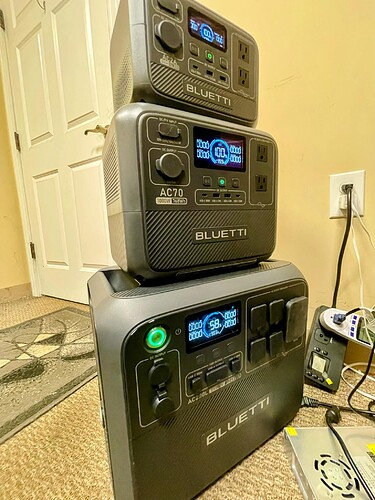Hello all,
I’m visiting a friend who’s already equipped with Bluetti. His devices are way to heavy and require a separate battery, which is too cumbersome and heavy for me. I find the concept very interesting though, especially with built-in batteries and see some potential uses for myself, however, I’m unable to properly identify the added value of the following pairs when comparing the devices:
- AC180 vs EB240
- AC200P vs AC200Max
The first pair, AC180/EB240, makes me wonder, for similar range of power and capacity, and similar solar input, what added value justifies the price gap? EB looks more portable, similarly capable and more suitable for transportation. Better capacity and less power for EB, the opposite for AC makes me wonder, too, given the price of batteries, why is the larger capacity less expensive? I would have naturally assumed to opposite.
The second pair, AC200P vs AC200Max looks quite similar. Max appears to me to be an upgrade of 200P, but with a price tag that seems to proportionally add less value.
Lastly, comparing AC180 to AC200P raises an eyebrow considering the ongoig sale (100eur difference between them). What criteria am I missing that would play in favor of AC180? It has much weaker solar input*, lower capacity, smaller invertor,
- NB I mean “weaker” in the sense that you must manage to cram 500 Watts within 60V, while 200P makes its 700W more versatile in terms of wiring with its range up to 150V. I can’t think of another criteria than weight (10kg less for AC180), but it looses so much utility that it makes AC180 too high in the price range, while its utility is closer, probably in practical situation, to the AC60 which seems more suitable for that segment.
AC200P seems, in my opinion, to have the best of all models:
- large capacity
- medium inverter power
- acceptable portability
- reasonably high solar voltage
Again, newcomer to Bluetti, but in solar for a while now (day job in renewables), hence the questioning ![]()
